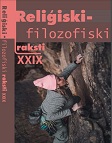BĪBELES VERBĀLĀ INSPIRĀCIJA, FUNDAMENTĀLISMS UN SIEVIETES LOMA BAZNĪCĀ
VERBAL INSPIRATION OF THE BIBLE, FUNDAMENTALISM AND THE ROLE OF WOMEN IN THE CHURCH
Author(s): Ģirts RoznersSubject(s): Christian Theology and Religion, Gender Studies, Sociology of Religion
Published by: Latvijas Universitātes Filozofijas un socioloģijas institūts
Keywords: Women’s ordination; Bible inspiration; verbal inspiration; Christian fundamentalism; Feminism;
Summary/Abstract: Most Christian denominations in Latvia still do not recognize the ordination of women as pastors. The article discusses the historical and theological reasons for this unequal treatment. Several causes of the problem are mentioned – in the 17th century after the theological crisis caused by the Reformation the doctrine of Lutheran orthodoxy on the verbal inspiration of the Bible appeared; in the 19th century out of the theological crisis of the modern age the Christian fundamentalism was born. Feminism, which opposed church dogmatism, among other things, played an important role in these discourses. In the 18th and 19th century America, thanks to the widespread evangelical awakening movements, many women in the churches preached and prophesied or acted as traveling evangelists. This shows the desire of women to break free from the boundaries of the traditional church. Behind it was a very simple logic: if the Bible, as a verbally inspired book, forbade women to teach, then personal divine inspiration re-granted this permission. Putting experience above formal teaching was rooted in the 18th and 19th century pietism and liberal theology. In turn, the second wave of Feminism in the 1960s was marked by the growing interest of women in studying theology, obtaining a PhD degree, and engaging in research. At that time, feminist theology also held stable positions in theology study programs. However, these discourses did not affect Latvia, which was behind the Iron Curtain at that time. In the second part of the article, the author pays attention to how the considered phenomena have found a place in the Latvian Christian environment. At the beginning of the 20th century, the influence of both Protestant Orthodoxy and Christian fundamentalism was present in Latvia, which manifested itself in a literal interpretation of the Bible and the resulting discrimination of women in the Church. However, that cannot be said about the clergy of the Lutheran Church, with the support of which the Faculty of Theology of the University of Latvia was founded in 1920, which embodied the academic and historical critical traditions of the German school of theology. Consequently, also in Latvia during the period of independence, a gap was marked between academic and evangelical biblical research, German critical and Anglo-Saxon evangelical theology. Until 1991, 5 women teachers were even ordained in Latvia. And yet, after 1993, the situation changed. At present, we cannot talk about a sufficiently strong influence of academic theology on the tradition of the Lutheran Church or other Christian traditions, which would permanently influence the situation after the restoration of Latvia’s independence. At the end of the article this is evidenced by the results of a qualitative study where the views and arguments of clergy of various Christian denominations on the issue of women’s ordination are analysed. This leads to the conclusion that in Latvian Christian faith, the high view of verbal inspiration on the Bible still strongly influences the interpretation of the text. Apparently, it seems safer to follow these ancient arguments of Protestant Orthodoxy and 19th-century fundamentalists than to follow the apparent changes in gender roles in the 20th and 21st centuries.
Journal: Religiski-filozofiski raksti
- Issue Year: XXIX/2021
- Issue No: 1
- Page Range: 203-228
- Page Count: 26
- Language: Latvian

